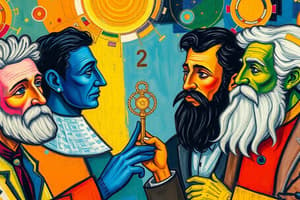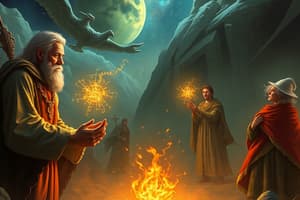Podcast
Questions and Answers
Who proposed the heliocentric model of the universe?
Who proposed the heliocentric model of the universe?
- Isaac Newton
- Nicolaus Copernicus (correct)
- Galileo Galilei
- Johannes Kepler
Isaac Newton is known for his contributions to anatomy.
Isaac Newton is known for his contributions to anatomy.
False (B)
What significant medical advancement is Edward Jenner known for developing?
What significant medical advancement is Edward Jenner known for developing?
smallpox vaccine
The laws of planetary motion were formulated by ______.
The laws of planetary motion were formulated by ______.
Match the following scientists with their contributions:
Match the following scientists with their contributions:
Which scientist is known for the phrase 'Cogito, ergo sum'?
Which scientist is known for the phrase 'Cogito, ergo sum'?
Thomas Hobbes advocated for democracy as the best form of governance.
Thomas Hobbes advocated for democracy as the best form of governance.
What law did Robert Boyle formulate, which explains the relationship between pressure and volume of gas?
What law did Robert Boyle formulate, which explains the relationship between pressure and volume of gas?
What idea did Rousseau introduce about government?
What idea did Rousseau introduce about government?
Locke believed that government’s purpose is to protect individual rights.
Locke believed that government’s purpose is to protect individual rights.
What did Montesquieu advocate for in government?
What did Montesquieu advocate for in government?
Mary Wollstonecraft wrote _ about women's rights and education.
Mary Wollstonecraft wrote _ about women's rights and education.
Match the thinkers with their key ideas:
Match the thinkers with their key ideas:
Which of the following best summarizes Beccaria's ideas?
Which of the following best summarizes Beccaria's ideas?
Catherine the Great completely embraced Enlightenment reforms in her rule.
Catherine the Great completely embraced Enlightenment reforms in her rule.
What was the primary focus of the Scientific Method?
What was the primary focus of the Scientific Method?
The _ was a period that fostered questioning authority and encouraged scientific exploration.
The _ was a period that fostered questioning authority and encouraged scientific exploration.
Match the thinker to their contribution to democratic beliefs:
Match the thinker to their contribution to democratic beliefs:
Who is known as the most 'enlightened' despot for promoting reforms while maintaining absolute power?
Who is known as the most 'enlightened' despot for promoting reforms while maintaining absolute power?
Thomas Paine wrote Common Sense to oppose American independence from Britain.
Thomas Paine wrote Common Sense to oppose American independence from Britain.
What invention helped facilitate the spread of new ideas during the Scientific Revolution?
What invention helped facilitate the spread of new ideas during the Scientific Revolution?
Newton referred to the 'giants' as _ who influenced his discoveries.
Newton referred to the 'giants' as _ who influenced his discoveries.
What was one of the main causes of the Scientific Revolution?
What was one of the main causes of the Scientific Revolution?
Flashcards
Geocentric Model
Geocentric Model
The theory proposing that the Earth is the center of the universe.
Heliocentric Model
Heliocentric Model
The theory proposing that the Sun is the center of the universe, with planets orbiting it.
Who proposed the Heliocentric Model?
Who proposed the Heliocentric Model?
Nicolaus Copernicus was a Polish astronomer who challenged the Ptolemaic geocentric model by proposing the heliocentric model. He published his groundbreaking work, On the Revolutions of the Heavenly Spheres, in 1543.
Who is Tycho Brahe?
Who is Tycho Brahe?
Signup and view all the flashcards
Who theorized planetary motion?
Who theorized planetary motion?
Signup and view all the flashcards
Who used a telescope to support the Heliocentric Model?
Who used a telescope to support the Heliocentric Model?
Signup and view all the flashcards
Who formulated the laws of motion and universal gravitation?
Who formulated the laws of motion and universal gravitation?
Signup and view all the flashcards
Who created the first smallpox vaccine?
Who created the first smallpox vaccine?
Signup and view all the flashcards
Social Contract
Social Contract
Signup and view all the flashcards
Absolute Power
Absolute Power
Signup and view all the flashcards
Jean-Jacques Rousseau
Jean-Jacques Rousseau
Signup and view all the flashcards
Declaration of Independence
Declaration of Independence
Signup and view all the flashcards
Separation of Powers
Separation of Powers
Signup and view all the flashcards
Enlightened Despot
Enlightened Despot
Signup and view all the flashcards
Encyclopédie
Encyclopédie
Signup and view all the flashcards
Natural Rights
Natural Rights
Signup and view all the flashcards
John Locke
John Locke
Signup and view all the flashcards
Voltaire
Voltaire
Signup and view all the flashcards
Cesare Beccaria
Cesare Beccaria
Signup and view all the flashcards
Thomas Paine
Thomas Paine
Signup and view all the flashcards
Scientific Method
Scientific Method
Signup and view all the flashcards
Scientific Revolution
Scientific Revolution
Signup and view all the flashcards
Renaissance
Renaissance
Signup and view all the flashcards
Study Notes
Scientific Revolution Figures and Contributions
- Nicolaus Copernicus (1473–1543): Proposed the heliocentric model, placing the Sun at the center of the solar system, challenging the geocentric view.
- Isaac Newton (1643–1727): Formulated laws of motion and universal gravitation, explaining object movement and interaction, fundamentally impacting physics, mathematics, and astronomy.
- Edward Jenner (1749–1823): Developed the smallpox vaccine, revolutionizing medicine.
- Tycho Brahe (1546–1601): Danish astronomer, made detailed and accurate celestial observations crucial for later astronomers like Kepler.
- René Descartes (1596–1650): Developed analytical geometry and the philosophical concept "I think, therefore I am," emphasizing reason and skepticism.
- Andreas Vesalius (1514–1564): Pioneered human anatomy through dissections, leading to more accurate depictions of the human body.
- Johannes Kepler (1571–1630): Formulated laws of planetary motion, indicating that planets orbit the Sun in elliptical paths, not perfect circles.
- Francis Bacon (1561–1626): Advocated for the scientific method and empiricism (gathering knowledge through observation and experiment).
- Robert Boyle (1627–1691): Founded modern chemistry, formulated Boyle's law detailing the relationship between gas pressure and volume.
- Galileo Galilei (1564–1642): Utilized telescopic observations to support the heliocentric theory, noting the moons of Jupiter and phases of Venus, strengthening Copernicus's model.
Enlightenment Thinkers and Influence
- Thomas Hobbes (1588–1679): Advocated absolute monarchy to avoid societal chaos, arguing for a strong central power in his work, Leviathan.
- Jean-Jacques Rousseau (1712–1778): Believed in the social contract, stating government should reflect the people's will, profoundly influencing democratic thought, especially during the French Revolution.
- Frederick II (Frederick the Great, 1712–1786): Prussian king partially influenced by Enlightenment ideas but maintained absolute power, implementing legal reforms and promoting education.
- John Locke (1632–1704): Advocated for natural rights (life, liberty, and property), claiming government protects these rights, and the right to revolt against unjust rulers.
- Cesare Beccaria (1738–1794): Advocated for legal system reform, opposing torture and the death penalty, emphasizing deterrence over retribution.
- Voltaire (1694–1778): Championed freedom of speech, religious tolerance, and separation of church and state, often using satire to critique authority.
- Mary Wollstonecraft (1759–1797): Advocated for women's rights, emphasizing education opportunities for women in her widely discussed essay A Vindication of the Rights of Woman.
- Montesquieu (1689–1755): Advocated for the separation of powers (executive, legislative, judicial) in government to prevent tyranny.
- Denis Diderot (1713–1784): Key editor of Encyclopédie, aiming to compile Enlightenment knowledge on science, philosophy, and industry.
- Thomas Jefferson (1743–1826): Heavily influenced by Enlightenment thinkers, particularly Locke, in drafting the Declaration of Independence, including concepts of natural rights and revolution against tyrannical governments.
- Thomas Paine (1737–1809): Influenced American independence through Common Sense, advocating for an Enlightenment-based government.
Key Concepts and Connections
- Scientific Revolution as a Renaissance Extension: The Renaissance's emphasis on reason, observation, and human potential sparked scientific inquiry and challenged traditional authority, logically paving the way for the Scientific Revolution.
- Four Main Causes of the Scientific Revolution:
- Renewed interest in classical ideas (Renaissance humanism).
- Development of the printing press, facilitating idea spread.
- Increased focus on observation and experimentation.
- Advancements in mathematics and technology (telescopes, microscopes).
- Scientific Method: A systematic approach to investigate the world, based on observation, hypothesis, experimentation, and analysis, contrasting with reliance on ancient texts and Church doctrine employed in medieval scholarship.
- Newton's "Giants": Newton recognized Galileo, Kepler, and Copernicus as predecessors whose work was foundational to his discoveries, highlighting the cumulative nature of scientific progress.
- Catherine the Great and Enlightenment: Catherine admired Enlightenment values like reason and reform but prioritized maintaining power, making limited, selective reforms.
- Enlightened Despot: Frederick II, known for legal reforms, education initiatives, and religious tolerance, is considered the most enlightened despot.
- Locke's Influence on the Declaration: Locke’s ideas on natural rights heavily influenced Jefferson's phrasing in the Declaration of Independence, justifying revolution to protect natural rights.
- Impact of Enlightenment Thinkers on Democratic Beliefs: Locke stressed natural rights and limited government, Montesquieu advocated for the separation of powers, Voltaire championed freedoms, Rousseau highlighted the social contract, and Beccaria championed justice.
Studying That Suits You
Use AI to generate personalized quizzes and flashcards to suit your learning preferences.
Description
Explore the groundbreaking contributions of key figures during the Scientific Revolution. This quiz covers influential scientists like Copernicus, Newton, and Jenner, among others, who transformed our understanding of the universe, physics, and medicine. Test your knowledge about their discoveries and lasting impact!




